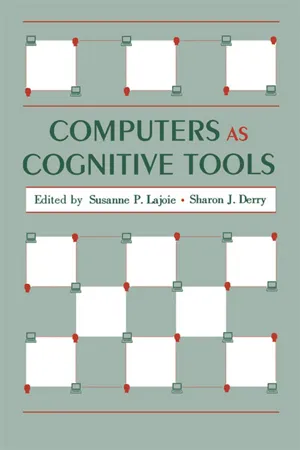
- 416 pages
- English
- ePUB (mobile friendly)
- Available on iOS & Android
Computers As Cognitive Tools
About this book
Highlighting and illustrating several important and interesting theoretical trends that have emerged in the continuing development of instructional technology, this book's organizational framework is based on the notion of two opposing camps. One evolves out of the intelligent tutoring movement, which employs artificial-intelligence technologies in the service of student modeling and precision diagnosis, and the other emerges from a constructivist/developmental perspective that promotes exploration and social interaction, but tends to reject the methods and goals of the student modelers. While the notion of opposing camps tends to create an artificial rift between groups of researchers, it represents a conceptual distinction that is inherently more interesting and informative than the relatively meaningless divide often drawn between "intelligent" and "unintelligent" instructional systems.
An evident trend is that researchers in both "camps" view their computer learning environments as "cognitive tools" that can enhance learning, performance, and understanding. Cognitive tools are objects provided by the instructional environment that allow students to incorporate new auxiliary methods or symbols into their social problem solving which otherwise would be unavailable. A final section of the book represents researchers who are assimilating and accommodating the wisdom and creativity of their neighbors from both camps, perhaps forming the look of technology for the future. When the idea of model tracing in a computer-based environment is combined with appreciation for creative mind-extension cognitive tools and for how a community of learners can facilitate learning, a camp is created where AI technologists and social constructivist learning theorists can feel equally at home.
Tools to learn more effectively

Saving Books

Keyword Search

Annotating Text

Listen to it instead
Information
Table of contents
- Cover Page
- Half Title Page
- Technology in Education Series
- Title Page
- Copyright Page
- Contents
- Preface
- A Middle Camp for (Un)lntelligent Instructional Computing: An Introduction
- Part I Model Builders
- Part II Nonmodelers
- Part III Bridging Differences In Opposing Camps
- Part IV Discussants
- Author Index
- Subject Index
Frequently asked questions
- Essential is ideal for learners and professionals who enjoy exploring a wide range of subjects. Access the Essential Library with 800,000+ trusted titles and best-sellers across business, personal growth, and the humanities. Includes unlimited reading time and Standard Read Aloud voice.
- Complete: Perfect for advanced learners and researchers needing full, unrestricted access. Unlock 1.4M+ books across hundreds of subjects, including academic and specialized titles. The Complete Plan also includes advanced features like Premium Read Aloud and Research Assistant.
Please note we cannot support devices running on iOS 13 and Android 7 or earlier. Learn more about using the app